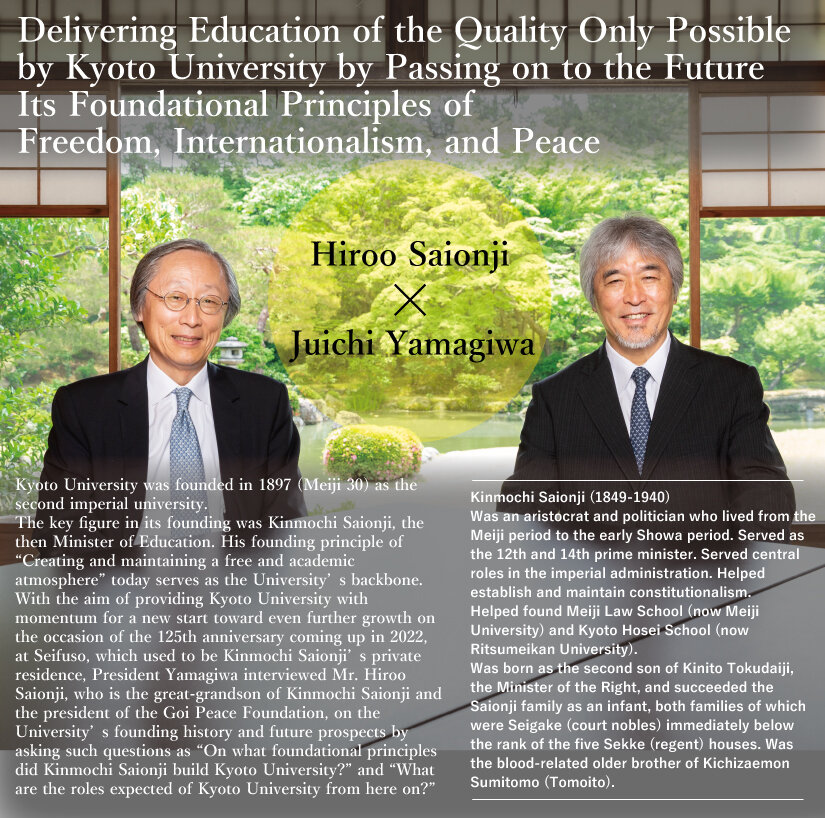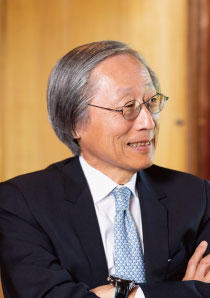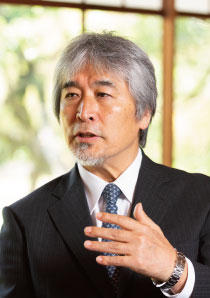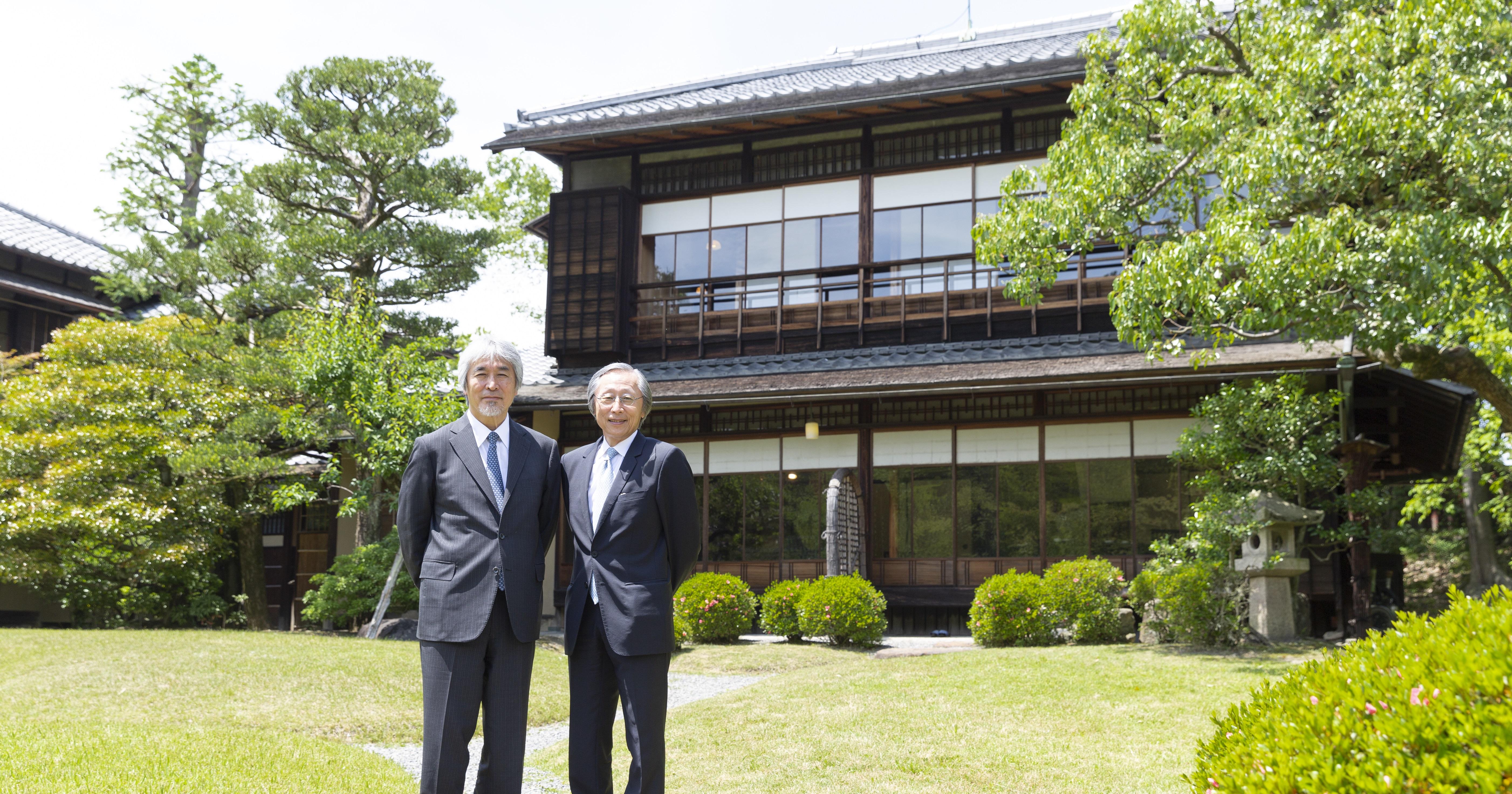Vol.15 Interview

Hiroo Saionji
President
Goi Peace Foundation
Born in 1949.Graduated from Gakushuin University's Faculty of Economics in 1971. Completed one of Michigan State University's Master's Programs in 1973 (Master of Business Administration). Worked at NSK Ltd.'s global headquarters from 1973 to 1986.
Was appointed President of May Peace Prevail on Earth, a U.S. NPO (and a UNDGC/NGO), in 1988. Assumed his position as President of the Goi Peace Foundation in 1999. Received the Indian Saint Shree Dnyaneshwara World Peace Award in 2008.
Received the Public Welfare Award for Social Education from the Minister of Education, Culture, Sports, Science and Technology in 2010.
Served as a member of the Japanese National Commission for UNESCO from 2008 to 2017.
The foundational principles of Kyoto University, formulated by
Kinmochi Saionji,
who knew the importance of education
Yamagiwa Kyoto University, the second imperial university after Tokyo Imperial University, was founded in Kyoto in 1897 (Meiji 30) at Duke Kinmochi Saionji's recommendation, the then Minister of Education. I heard that Duke Saionji had a strong passion for education, by which he was driven to open a private school at a young age.
Saionji Kinmochi opened his private school when he was 20 years old, immediately after the Meiji Restoration. I heard he was motivated by his belief that "building a nation is about building its people." Subsequently, his passion grew stronger, leading him to found Kyoto University.
Kinmochi studied abroad in France for 10 years from the age of 21. Subsequently, he served as the envoy to Austria and then Germany, experiences that led him to become one of the first in Japan to advocate the principles of liberalism, internationalism, and pacifism. However, winning the Sino-Japanese War (1894 to 1895) escalated militarism, guiding Japan in the direction against Kinmochi's wish.
In 1895, through a magazine, he released a statement along the following lines: "The outcome of the Sino-Japanese War has drawn the attention of citizens of other countries. However, if we want to earn their respect, we must pay attention to international trends so that we can long maintain and even further improve our country's good fortune by cooperating with civilizations worldwide."
In addition, in response to the Imperial Rescript on Education prepared by Kowashi Inoue and others, recognizing the extreme nationalist ideology that underlay it, Kinmochi proposed, as the then Minister of Education, a more liberal version of the Rescript, which was developed around the three pillars of promoting technological development, cultivating internationalists with foreign language education, and creating equal opportunities for education. Despite his proposal being rejected, Kinmochi continued to firmly believe in the essential need of an education designed to cultivate a younger generation that cherishes liberal values. I believe his earnest wish to offer such an education led to the founding of Kyoto University.
Yamagiwa I understand that, unlike Tokyo Imperial University's founding principle of cultivating government officials, that of Duke Saionji, which was to create a place for pursuing academic liberty, was the origin of Kyoto University's culture of academic freedom.
Saionji Kinmochi felt suffocated and rebellious against having to live a rigid life as a Kuge (aristocrat). So, he must have cherished the value of freedom he discovered while studying abroad in France.
On another note, I read through Kyoto University's mission statement and greatly admired it. What I found most characteristic of Kyoto University was the idea to integrate the humanities and sciences into interdisciplinary approaches, as is reflected in the following extract: "Kyoto University will strive for diverse development in pure and applied research in the humanities, sciences and technology while seeking to integrate these various perspectives."
Yamagiwa I completely agree. Unlike western universities, Japanese imperial universities have primarily originated as faculties of the sciences. However, Kyoto University has a tradition of philosophy centered around Kitaro Nishida's study.
Nishida began teaching at Kyoto University in 1910, having great influence on people of various fields, including my teacher's former professors, Dr. Kinji Imanishi and Dr. Hideki Yukawa.
Science is based on the law of excluded middle, which states that any proposition is either true or its negation is true, eliminating intermediate possibilities, as does digital technology, all forms of which are based on the binary system of 0 or 1. Nishida questioned this tradition of western philosophy and distanced his philosophy from modern science's objective mode of thinking. He refused to classify everything as right or wrong, which spirit I believe is greatly in line with the practice of integrating the humanities with science.
The significance of Kyoto University's mission
to pursue "harmonious coexistence"
Yamagiwa I heard that the Goi Peace Foundation was certified as an official member of UNESCO (United Nations Educational, Scientific and Cultural Organization) in 2006. What kind of activities does it perform?
Saionji One of the primary pillars of our activities is youth education, which is centered around ESD--or Education for Sustainable Development--aimed at cultivating leaders of future efforts to create a sustainable society. In response to a UN resolution, countries worldwide are instituting ESD measures led by UNESCO, and activities conducted by our Foundation have also been certified by the Organization.
Yamagiwa While sustainable development has been pursued since the 1970s, it has not yet been achieved. We currently exceed four of the nine planetary boundary limits, severely threatening our world environment. So, I believe the significance that lies in ESD is greater now than ever.
Saionji We must turn our attention to the truth before our eyes, which is that serious issues, including microplastic marine pollution and pessimistic views of the lifespan of earth, do exist. Many people may be thinking that nothing could happen within their time. However, being fair to future generations is a responsibility we must meet, which is the principle underlying our ESD activities.
Yamagiwa Despite the meaning of sustainability being in passing this planet on to the next generation in the same condition as it was when passed on to us, current technological development efforts are headed toward preparing us for when the planet becomes uninhabitable to the human body.
Saionji I believe that Kyoto University's aim to "contribute to the well-being of the world," as is written in its mission statement, is particularly important now.
Technology has conventionally been a tool for making the world more comfortable and convenient. However, should that continue to be the goal of technology? We are at a time when greater significance lies in Kyoto University's principle of "contributing to the well-being of the world through interdisciplinary science approaches," so we must return to the basics and ask ourselves, "What should the goal of technology be?"

Protecting diversity leads to sustainability
Saionji When considering what the ideal model of sustainability and the future of technology should be, what helps is learning from nature and other living things. I assume the same could be said about your field of expertise since it involves gorillas. Our planet is one big life form comprising all living things. Instead of doing as we please as a separate species, we need to search for a way to coexist with all other species.
Yamagiwa Being a zoologist, I cannot agree with you more. Over 90 percent of today's terrestrial mammals are livestock, which shocking situation is a result of us using all of earth's resources for ourselves and our livestock. Until now, our use of technology has focused on dominating the world. However, from here on, we must change our technological development perspective to one that views the happy life of all living things as connected to our own happiness.
Saionji Sustainability and diversity are interrelated. Humanity could not have survived without diversity. Our survival and our planet's sustainability depends on whether we can accept and thereby protect diversity.
Yamagiwa Thanks to advancements in genome sequencing, recent findings from research into the origin of the Japanese race shows that unlike the conventional theory, which suggested that the Yayoi immigrants from the Asian Continent had overwhelmed the Jomon natives, the two groups interbred, becoming culturally assimilated as well. The history of the Japanese race had not been one group dominating the other but one of assimilation. Cultural assimilation is also taking place in mainland China and Central Asia. None of us are fundamentally incompatible with one another. Diversity is a product of assimilation.

Accepting diversity by understanding and respecting differences
creates communication
Saionji Our Foundation's vision, the "Declaration for All Life on Earth," stipulates, as one of its four general principles, that it shall show "Respect for all differences." The ability to show respect for all differences is essential for accepting diversity.
Yamagiwa A male student who studied abroad by using our Experience-based Overseas Travel Support System called "Omoro (interesting) Challenge" once told me, "I always thought that intercultural coexistence meant to understand other cultures, but what I learned from studying abroad is that one culture differs from another, which I now realize is known as cross-cultural understanding." I was impressed. Understanding another culture completely is almost impossible. So, we need to first understand that cultures differ if we want to become able to accept and communicate with those of other cultures.
Saionji I agree. To respect differences, we first need to realize that all cultures differ. In addition, we need to change ourselves into people who can enjoy cultural differences. The world would become a boring place if everyone began to behave like robots.
Yamagiwa While advancements in computer science, including artificial intelligence, aim to expand our relationships and contribute to the well-being of society, they could also threaten our respect for each other and jeopardize individuality. Using artificial intelligence to evaluate people and calculate expectation value could lead to standardization and greater disparity, as has already been observed in such countries as the U.S.
Saionji Advancements in artificial intelligence worry me as well. As a practical issue, A.I. robots could take over many people's jobs. As a theoretical one, highly sophisticated developments in artificial intelligence could progress to the point where we lose control of A.I. robots.
Technological development must stay within the limits of control by people with ethics and morals. As can be said about all sciences, artificial intelligence is also nothing more than a tool. The bottom line is tools require educating their users to take proper control.
Yamagiwa Advancements in information and communications technology also concern me because, because of its passive nature, it could adversely affect its users' communication skills. I already see more students unable to walk up to their classmates to talk and make friends.
Actual face-to-face communication takes place in real time, requiring us to understand not only our interlocutors' utterances but also their emotions by reading facial expressions and body language, and if misunderstood, we make corrections by choosing the right words. Real life communication is highly complicated and requires effort. Therefore, when communicating in a language other than our mother tongue, we must not miss any nonverbal messages. I have experienced communicating in another language in Africa and actually found it easier to connect by heart.
Saionji You even communicate with gorillas. You can communicate without words and do so with even a species other than your own.
Yamagiwa You're right (laughs). Did you know that the white of the eye is not found in gorillas and monkeys but only in humans and greatly helps convey our feelings? Using the movement of our eyes and facial expressions to convey more than we could with just words enhanced our communication skills.
Delivering education of the quality only possible by Kyoto University
by upholding its foundational principles
Saionji Kinmochi died in 1940, the year before the Pacific War began. He was always against wars. I heard he once stated, "Where is our country headed?" lamenting its future. He then said: "Japan should not pursue becoming militarily strong. Its aim should be to win the respect of other nations." I believe this still has great significance today. Improving a country's chances of developing healthily requires increasing its number of healthy citizens, which again highlights the importance of education.
Yamagiwa I completely agree. Another thing I consider important is to have pride in our own country. Our leaders in both the political and industrial sectors seem compelled to believe that Japan is behind other nations.
Their belief invaded our country's educational settings as measures for redesigning our college education system into a standardized one, when what education actually needs is diversity.
Saionji Yet, Kyoto University impresses me as having the spirit needed to adopt a long-term perspective in conducting education and research without worrying excessively about immediate outcomes, enabling itself to concentrate on the basics, rather than the how-tos.
Yamagiwa I'm truly honored by your words. Thank you very much. Pursuing our mission of cultivating people able to create a better future by predicting constant global changes and thinking a few phases ahead requires more than helping students learn with textbooks and lectures. We need to maintain the quality of our education and research at levels only achievable by our University, which requires our instructors to work hard by inspiring each other.
Saionji In other words, those who instruct others also need to continue improving themselves so that they can help the younger generation create a better future.
Yamagiwa Yes. The Internet has brought changes to college education. Today, we can listen to lectures by renowned scholars of countries worldwide. However, recorded online lectures are one-way transmissions of information. The value of a college education lies in the opportunities to discuss matters with instructors and classmates, develop one's thoughts, and take on new challenges.
On the other hand, college campuses are not the only venues for learning. I would like students to actively explore the outside world to train themselves through many trial and error experiences.
Lastly, is there any message with which you would like to leave Kyoto University on the occasion of its upcoming 125th anniversary?
Saionji An important quality of any university is its basis on which it develops its guidance on what students need to study, which in Kyoto University's case is explicitly defined in its mission statement. I hope Kyoto University forever continues upholding its foundational principles.
We all of course have our own personal interests. However, the desire to help promote public interest is also in our nature. Both are important. However, I truly want Kyoto University to cultivate generous people who can value the latter type of desire by putting public interest first to "contribute to the well-being of the world," and I look forward to seeing the University's educational philosophy continue being based on liberalism, internationalism, and pacifism, or its foundational principles formulated by Kinmochi.
Yamagiwa The year 1949, a century after the birth of Duke Saionji and also the year Mr. Hiroo Saionji was born, was when Dr. Yukawa won the Nobel Prize in Physics and also when the Science Council of Japan, of which I serve as president, was founded. I personally believe this cannot be a mere coincidence. I pledge to do my best to help Kyoto University pass on its traditions that have been upheld for nearly 125 years and also help it proceed into the future, while making Duke Saionji's spirit well known throughout the Science Council of Japan, respecting Mr. Hiroo Saionji's strong passion for world peace and also taking pride in the fact that Kyoto University produced the first Japanese Nobel Prize winner. Thank you very much for your time today.



